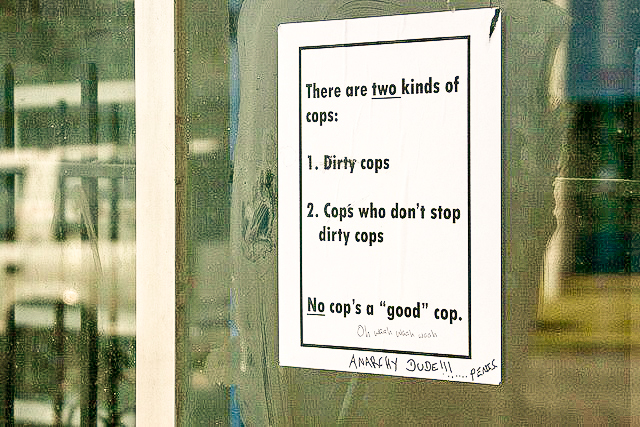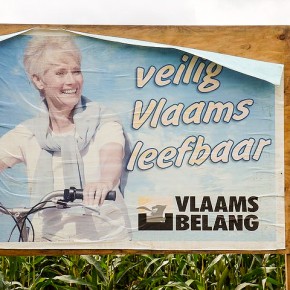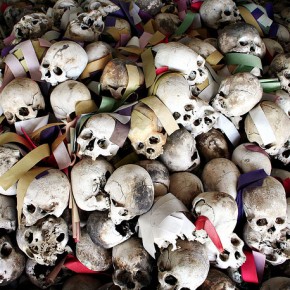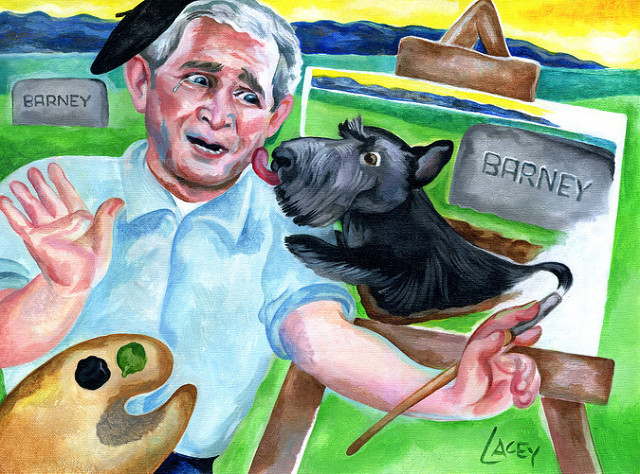I have to admit, I hadn’t heard of Ferguson, Missouri until this week. And yet, here it is, laid out in international media. It started with an unarmed young black man, Michael Brown, shot and killed by a police officer the hacking collective Anonymous has identified as Bryan Willman (though this hasn’t been confirmed.) The community, mostly black, responded in outrage and sadness, creating a new protest sign—their arms in the air. This is an act of solidarity with Brown as he, according to witnesses, had his hands up to show he was unarmed before he was shot to death.
Now the streets are patrolled by cops who resemble American soldiers at war, using the same style of weapons, tanks and uniforms. Reporters are being arrested and assaulted on dubious grounds. Residents say they have been shot at with tear gas canisters while on their own property. These military-style cops have reportedly pointed guns at non-violent crowds, and one white officer even called predominantly black protesters “animals.” It is no longer the land of the free, but islands of freedom, and islands of martial law, no matter what any police spokesman says.
A great many seem shocked that Anytown USA looks like occupied territory, but they shouldn’t. On the one hand, Americans got a little taste after the Boston Marathon bombings, when local law enforcement effectively put the entire metropolitan region on lockdown, combing the streets in military gear few Americans had ever seen on the local patrols. It was ridiculous for many reasons; for instance, why would Boston cops wear green fatigues in an urban environment? The message is clear whenever something like this happens: this isn’t a crime scene. This is a war zone. And we’re in charge.
For many Americans, mostly people of color, this has been the reality for a long time. Policing has taken the form of occupation; military-like targeting over general public safety. The taxpayer isn’t the public citizen who is to be protected, but the suspect to be hassled and assaulted. It once sounded like ultra-left hostility to mention this, but that’s changing. One of the best books on the subject of American police militarization is Rise of the Warrior Cop by Radley Balko, a principled libertarian. Conservative writer A.J. Delgado recently took to the National Review, arguing persuasively that it made no sense for the Right to at once support American excessive policing while claiming to be against unaccountable government expansion that infringes upon individual liberties.
There are competing theories to how we got here. One holds that the United States had a distribution problem at the end of the Cold War, which led to an abundance of military-grade hardware, at the same time that new requirements seemed necessary as a result of the Drug War. This led to the surplus goods being funneled to law enforcement agencies across the country, instead of being sent abroad. The War on Terror allowed for this trend to be kicked into overdrive. Another goes back further, arguing that our policing structure goes back to American occupation of the Philippines, and that our own domestic policing strategies have always mirrored our imperial expansion abroad. There is some dark truth to people who say that Ferguson looks like Baghdad.
Whatever the reason, we will continue to have pockets of Ferguson in the United States so long as budget cuts are imposed. Fewer public schools, closed libraries, fewer jobs, lower or stagnant wages, and slashed public benefits all mean one thing: more crime. For law enforcement agencies, that means more funding for more gear. Austerity and excessive state security go hand-in-hand. After all, the state can’t maintain itself in times of immense social unrest (which budget cuts bring about) with people getting restless, as they are right now in Ferguson. The natural response is heavy-handed responses, which ultimately make the residents even angrier. If something doesn’t change quite radically, we could see the pockets of Ferguson meaning pockets of martial law in America: mostly in other towns that we have never even heard of, but will it end there?
Photograph courtesy of Paul Sableman. Published under a Creative Commons License.





